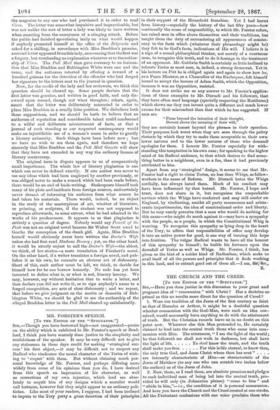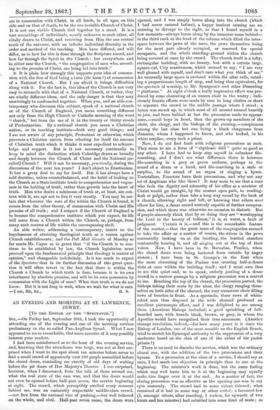THE CHURCH AND THE CREED.
[To THE EDITOR OF THE " SPECTATOR.1 SIR,—Have you done justice in this discussion to your great and' pregnant idea of " communion " with Christ ? Has a doctrine so. primal as this no results more direct for the question of Creed?
1. Were our tradition of the Jesus of the first century as faint as that of Heracles or Arthur, it might be a doubtful question whether communion with the God-Man, were such an idea con- ceived, would necessarily have anything to do with the attainment of truth. But the Christian records leave us in no doubt on this. point now. Whatever else this Man pretended to, He certainly claimed to lead into the central truth those who came into com- munion with Him. The utterances, "I am the light of the world ; he that followeth me shall not walk in darkness, but shall have
the light of life . Ye shall know the truth, and the truth shall make you free For this is life eternal, to know thee,
the only true God, and Jesus Christ whom thou has sent" . . . are intensely characteristic of Him—as characteristic of the Jesus of Matthew (to any one who can scratch two inches below- the surface) as of the Jesus of John.
2. Now, these, as I read them, are absolute promises and pledges to each individual man of being led into the central truth, pro- vided he will only (in Johanniue phrase) "come to him" and "abide in him,"—i.e., the condition of it is personal communion.. And here you have the Church and the Creed created at one stroke. All the Protestant confessions with one voice proclaim those who
are in communion with Christ, in all lands, in all ages, on this aide and on that of death, to be the one invisible Church of Christ. It is not one visible Church tied together by a creed. It is a vast assemblage of individuals, mostly unknown to each other, all vitally drawn to Christ, and receiving from Him the one central truth of the universe, with an infinite individual diversity in the order and method of the teaching. Men have differed, and will differ, as to how far this is done through the Scripture record, and how far through the Spirit in the Church : but everywhere and in either case the Church, "the congregation of men who, accord- ing to the promise of Christ, are being led into truth."
3. It is plain how strongly this supports your idea of commu- nion with the Son of God being a term (the term?) of communion of a National Church. But I am afraid it brings difficulties along with it. For the fact is, this idea of the Church is not very easy to reconcile with that of a National Church, or rather, they are wholly different ideas, and the only danger is that they may unwittingly be confounded together. When you, and an able con- temporary who discusses this subject, speak of a national church or of the Church of England, you mean something different not only from the High Church or Catholic meaning of the word "church," but from the use of it in the twenty or thirty creeds of Protestantism. By a national church you mean a Christian nation, or its teaching institute—both very good things ; and I am not aware of any principle, Protestant or otherwise, which prevents a Christian nation from selecting for itself the amount of Christian truth which it thinks it most expedient to acknow- ledge and support. But is it not necessary continually to keep in mind the distinction which Coleridge draws so broadly and deeply between the Church of Christ and the National (so'. called) Church ? Will it not be necessary, practically, during the discussions of the next ten years? I don't object to Erastianism. It has a great deal to say for itself. But it has always been a cold doctrine, unless counterbalanced, and the habit of looking on the Church as a State institute tends to comprehension and vague- ness in the holding of truth, rather than growth into the heart of truth. Men who desire a minimum of truth or, at least, are con- tent with it, are apt not to live it very stoutly. You may be cer- tain that wherever the core of fire within the Church is found, it comes from the other theory, of communion with Christ and His promise of all truth ; and I suspect if the Church of England is to become the comprehensive institute which you expect, its life will come from a Church within the Church, or, perhaps, from many such centres of life within the encompassing shell.
An able writer, addressing a contemporary, insists on the hopelessness of attaining theological truth as a reason against Church establishments; and the Pall Mall Gazette of Monday so far meets Mr. Capes as to grant that "if the Church is to con- tinue to be established by law, the Church legislation must proceed upon the fundamental principle that theology is matter of opinion," and changeable indefinitely. Is it too much to expect of the Spectator that in its further discussion of this great ques- tion it will often revert to the fact that there is within the Church a Church to which truth is dear, because it is its own inheritance by absolute promise, and will be its own possession by communion with the Light of men? What that truth is we do not know. But it is not long to wait, when we wait for what is sure.































 Previous page
Previous page